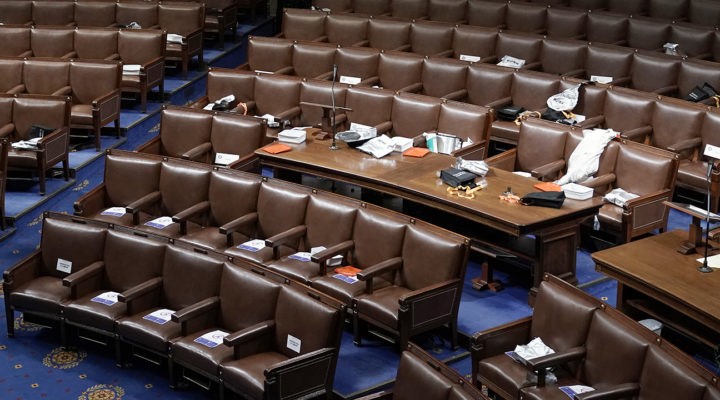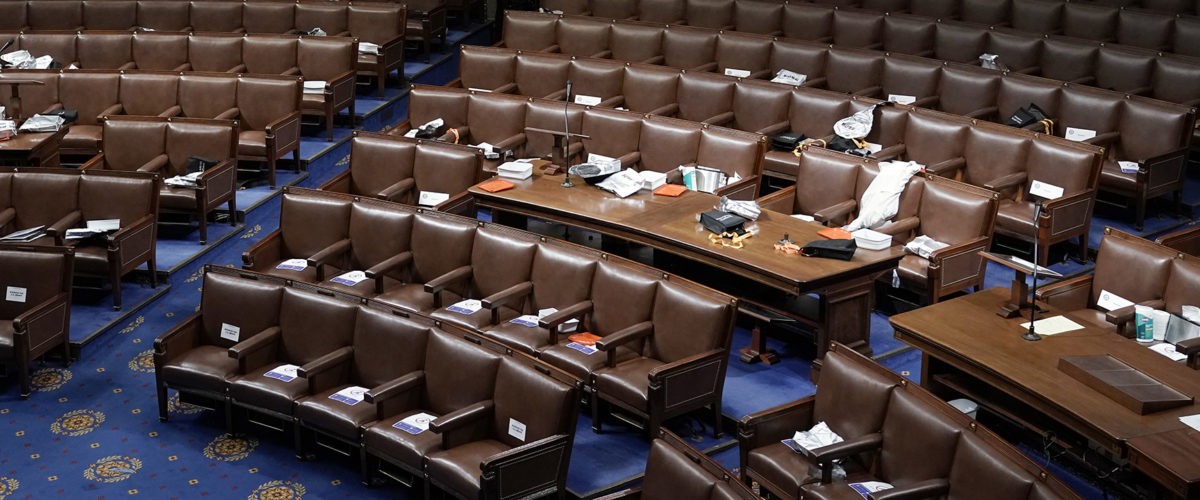As I reflect on the violent attack on our nation’s Capitol, words that continually linger in my mind are “trauma” and “hope.” Still, why would I write about the siege of the Capitol when so many have already written eloquently about the horror we watched on our televisions?
There is only one reason to add my perspective, and it is that I want to focus on the trauma we now must acknowledge. And the hope that prevails in spite of it.

Kathy Manis Findley
Those of us who are people of faith do not have a divine bubble around us that keeps out traumatic events and prevents our adverse reactions. Jan. 6 happened, and we watched it on our televisions. Seeing it was an abrupt assault on our emotional well-being. Diana Butler Bass wrote recently about the reaction of “surprising and unanticipated grief” in the following words:
Why was I sitting in my family room, staring at CNN, and screaming at terrorists in the Rotunda? Why tears upon reading that the invaders defecated on those floors? Why the blinding rage of seeing the Confederate and Trump flags waved in that particular place?
This was a moment when theory didn’t address my own reality. When my theology of church and state failed. Somehow, the Rotunda is sacred. Even to me, long cynical of American civil religion. “Desecration” is the only word to describe what happened this week. And my initial anger has given way to a surprising and unanticipated grief.
‘Surprising and unanticipated grief’
After an initial shock, “surprising and unanticipated grief” can result in a traumatic stress response, which usually manifests after some time has passed and the mind has continued to unpack what has happened. Consider that watching television long has been a leisure, pleasant activity. It entertains us. It is a safe activity we do at home. As we watch, we sometimes laugh or cry or cheer.
On Jan. 6, 2021, while watching television, we watched — in real time — hordes of angry, violent people intent on doing great harm to the United States Capitol and the people inside. We saw faces of distress, shock, fear — strong emotions churning inside so many people who were suddenly under siege.
The act was insurrection. It was an act of terrorism that affected not only the persons present in the building, but also significantly affected the millions of Americans who watched. From the very place that entertains us, we suddenly saw horror in a real place against real, live people. It shocked us, undeniably shocked us.
“Every person I talked with reported experiencing strong emotional reactions as they watched the insurrection.”
I talked with the members of my Sunday school class and dozens of others after that day. Every person I talked with reported experiencing strong emotional reactions as they watched the insurrection. Some felt heartbroken, others enraged, others fearful, but they described those emotions as being very forceful and all-consuming, powerfully affecting their minds, senses or emotions.
As details emerged in the days to follow — such as the intended hanging of the vice president or the murder of the speaker of the House — I observed that my friends had developed troubling symptoms of acute trauma. When a loud sound echoed through a neighborhood, my friend’s family reacted strongly to it, imagining gunfire. When another friend continued hearing news reports, she would cry uncontrollably. Another person would begin to tremble, feel weakness in her legs and hear her heart “beating louder and faster.” Another told me she is suddenly feeling very afraid. Still another felt unrelenting grief to the point of saying, “I am heartbroken and feel so heavy, and then suddenly I feel panic. It happens many times every day.”
Responding to trauma
These are traumatic stress responses triggered by an unexpected, troubling event that threatened our sense of safety and security. With my pastor’s heart, I want most to comfort my friends and to offer a fresh sense of hope. Yet, these troubling events and reactions also force me to put on my hat as a trauma counselor. From that place, I want to encourage them to seek a spirit of calm by intentionally doing several things:
- When you experience a traumatic stress response, sit quietly to ground yourself. Breathe deeply, several deep breaths. Try to lower your heart rate by breathing very slowly. If you are feeling fear, assure yourself that you are in a safe place. If you want to cry, let your tears come. If you are angry, express it out loud until you are able to calm yourself. If you are able, ask God to guide you safely through the day and give you comfort.
- Try to get a little extra rest.
- Spend some time alone, contemplating your life, thinking of the good things in your life as you try to put the current events and your reaction to them in perspective.
- Contact a trusted friend when you feel vulnerable.
- Spend quality time with the supportive persons in your life.
- Tell yourself that what you are experiencing is a normal reaction to the violent acts you witnessed.
- Your trust in something solid has been harmed. Name the places or persons in your life in which you can safely place your trust.
- Reach out for help if you need to with a therapist, trauma counselor, spiritual director, minister or even a trusted friend.
Certainly, this list of remedies is not an exhaustive one, but it does offer some ways to push through a traumatic stress response. We cannot assume that since we are in God’s care, we will not have strong emotional responses to traumatic events.
As we hear news reports of similar events planned for the inauguration or other future events, stress responses will not likely diminish right away. Each trigger will send to us the message that our country is not safe, that individuals are not safe. So awareness of emotional responses is important, especially with children.
Pay close attention to children and teens
We cannot assume that children, from teenagers to the very young child, do not take in this kind of violence, although it was not in close physical proximity to them. Children might respond in varied ways when their safety is threatened, and sometimes their sense of safety is threatened by witnessing even milder forms of violence than the attack on the Capitol.
“We cannot assume that children, from teenagers to the very young child, do not take in this kind of violence.”
We must also consider what children are hearing or overhearing that might intensify their fear. Teenagers may withdraw and try to mask their emotions. Don’t assume they have not been affected by what happened. Find ways to engage them in conversation. Be aware also that very young children might be more aware of what happened than you think. Their responses might be changes in sleeping patterns, sudden clinginess, changes in routine behaviors.
It is important to be aware of the many ways children and teenagers react when they are exposed to an event that could be traumatic for them. There are many online resources for helping children through traumatic events. The National Child Traumatic Stress Network is a very good resource on child trauma. Look for the section of their website that offers pertinent information on risk and protective factors for children who have experienced or witnessed a traumatic event.
A word about elders
Older adults also experience traumatic events in unique ways. For those who experienced prior violent events — from family violence, to community violence, to war — reactions can be very troubling. One I have noticed after the Jan. 6 events is grief to the point of being inconsolable.
Has your elder family member or friend served in a war? Has your elder worked as a police officer? Has your elder witnessed violence in the past? Is your elder family member very patriotic to the point of considering the U.S. Capitol as a sacred monument that was viciously desecrated? Is your elder an immigrant who fled from an oppressive country and who placed complete trust in American freedom?
If any of these questions apply to your elder family member or friend, be alert for signs of unusually strong anger, increased fear or anxiety, depression, self-isolation and withdrawal, long periods of pensiveness, sleep disturbance, a sense of hopelessness or any behavior that seems out of the ordinary. Be present with them with comfort and tenderness. Start a conversation if you can. Tell them how you felt as the Capitol was being attacked. In those who have lived through many decades, the response is often the loss of hope.
All of us are on edge
Perhaps all of us have been unsettled by the Jan. 6 insurrection and have experienced a loss of hope. We are likely caring for ourselves and bracing for more in the days ahead. We are caring for our children, our families and our friends.
“We are citizens of a nation we love and people of faith who lift our voices against violence and injustice.”
We are citizens of a nation we love and people of faith who lift our voices against violence and injustice. We are friends who worry about our friends, parents who worry about children, children who are concerned for parents, pastors who want to care for congregations, teachers who want to teach non-violence, counselors who want to gently move persons from fear to hope. We are some or all of these people, for one another. Always for one another.
Stay safe. Stay alert. Watch out for others. Care for your heart. Nourish your soul. Hold on to your hope. Even traumatic, violent experiences do not hold the power to destroy us, because in the end, we are a people of God who still believe in the possibility of beloved community. We push back against those who would divide us.
We throw aside our anger, at least for a moment, and vow to seek peace. We move past our fear and stand courageously to restore our way of life as citizens of a nation and a people of God’s heart. We push through our trauma to do the healing work that God wills us to do in search of hope, the living hope that God desires for all of us.
Kathy Manis Findley is an ordained Baptist minister with Greek Orthodox roots. Now retired in Macon, Ga., she spent her 38-year ministry serving as a pastor, hospital chaplain, trauma counselor and missionary to Uganda. She is a graduate of Southern Baptist Theological Seminary and is certified in victimology, trauma intervention and child forensic interviewing. She is the author of two serious books, Voices of our Sisters and The Survivor’s Voice: Healing the Invisible Wounds of Violence and Abuse, and just for fun, one Kindle novel.


